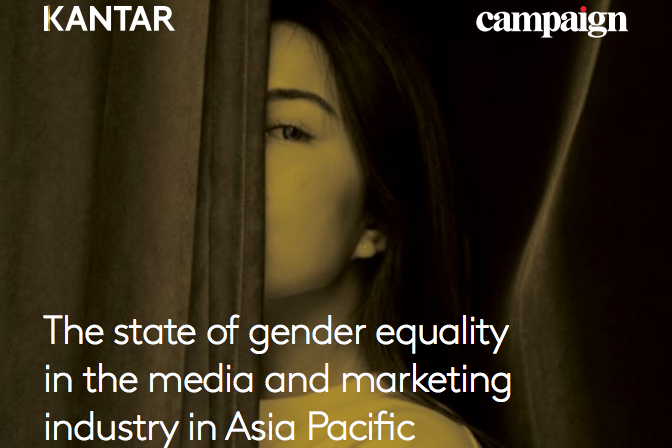When Kantar and Campaign Asia-Pacific launched, in 2017, an ambitious new project to poll Asia's marketing and media industry on their perceptions of gender in the workplace last year, it was in the hope that collecting hard data would highlight the issues at stake and act as the foundations of positive change.
The 2017 results found that women wanted to lead, but had access to fewer opportunities than men. Women felt they were judged more on who they were - particularly their age and gender - rather than their abilities and experiences. Both genders wanted to see more development opportunities, a stronger commitment to flexible work scheduling, mentoring programmes and pay parity.
One year on — a year that turned out to be tumultuous for the global gender equality movement — and we have the results of the 2018 survey, which ran in March and April. As Atifa Silk, Campaign Asia-Pacific brand director puts it, they make, on the face of it, for "grim reading". Here's what we learned.
Change hasn't been fast enough or visible enough
Similar numbers of men and women agree that meetings are still dominated by male staff compared to last year. This varies by region, however: only 15% of respondents in Southeast Asia said male-dominated meeting environments were commonplace, compared to 45% in New Zealand and 28% in Greater China.
The presence of a female CEO changes the dynamic within meetings, halving the amount of male dominance reported, the survey found.

The numbers of men and women who said they wanted to see their organisation doing 'much more' to drive gender parity were also up on last year, by 7% for women and 12% for men. The genders want slightly different actions to be taken: men put unconscious bias training and flexible working as their top priorities for working towards a more gender neutral workplace, while women want the needle to move on the whole package of issues, from flexible working and development opportunities to mentoring programmes, pay parity, networking opportunities and other corporate support programmes.
People want to be able to talk in safety about sexual harassment
Both genders put 'sexual harassment training' low on their list of priorities for companies to address. Yet to assume this means inappropriate behaviour doesn't exist in the workplace would be wrong: our survey shows that 48% of women and 26% of men have personally experienced verbal or physical harassment and 40% of women and 18% of men say they have observed it happening to others.
The most common form this took was 'feeling uncomfortable at sexual innuendo or jokes made in your presence', experienced by 32% of women and 15% of men. Just 2% of women and 3% of men reported experiencing sexual abuse. 20% of women had faced 'unwelcomed physical contact', however, and a further 11% said they had observed a co-worker making 'unwelcomed physical contact'.

Even more startling is the number of people who reported any instance of harassment to their employer: just 14% said they had done this. The majority (69%) said that the top factor that would make them more likely to report what they have seen or faced would be 'knowledge that action would be taken without my career suffering.'
Awareness is growing: the unconscious is becoming conscious
While the above statistics around experiences of sexual harassment in the workplace are eye-opening, they do at least suggest that workers have an awareness of what constitutes inappropriate behaviour, the first step towards implementing cultural change. It's now down to organisations to ensure that the right reporting procedures are in place to help employees call it out in safety.
Awareness around other themes that tie into gender equality are also up overall. The number of people who said they were unaware of what unconsicous bias training was has halved since 2017, from 32% to 14%.
And a notably higher proportion of both genders are now noticing disparity, for example around men getting more respect than women in the workplace. This rose from 28% in 2017 to 37% overall in 2018. The sense that women are respected less was more pronounced (40-48%) among people who work for tech or service providers, media owners or brands compared to agencies (27%).
This ties in with our headline finding from last year's survey, that women are broadly more equal in the agency environment than they are within brands or tech companies.
The key to change lies in cultivating a broad 'gender culture'
As Anne Rayner, chief solutions officer at Kantar's Insights Division writes in her op-ed analysing these results, "institutional sexism is self-perpetuating".
Half of both genders say they feel pressure to conform to gender stereotypes at work, finds the survey. But this is much more marked (76%) among those who felt that their companies didn't treat men and women equally overall compared to companies that cultivated an environment of equality.
"Businesses that do not create an equal environment for employees are increasing the pressure to conform for both genders. And this pressure diminishes both men and women," writes Rayner.
People who work in firms they felt were broadly more equal also reported fewer meetings dominated by male staff compared to those who didn't, and fewer said they had experienced or witnessed sexual harassment.
This suggests that working towards a gender culture that is balanced across all aspects of the workplace, from meetings to hiring to day-to-day interactions, is more important than any single policy or training a company might implement. As gender equality — and, concurrently, inequality — become more visible and more talked about, now is a critical time for companies to act.
| The Campaign-Kantar Gender Study investigated men and women's perceptions and experiences of gender in media and marketing workplaces across Asia Pacific in March and April 2018. The results were presented at the Women Leading Change Conference in Singapore on May 31, 2018. |









